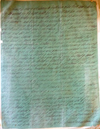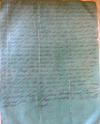Mahatma Letter to H. S. Olcott - LMW 2 No. 11
| Quick Facts | |
|---|---|
| People involved | |
| Written by: | Serapis Bey |
| Received by: | Henry Steel Olcott |
| Sent via: | unknown |
| Dates | |
| Written on: | unknown |
| Received on: | unknown |
| Other dates: | unknown |
| Places | |
| Sent from: | unknown |
| Received at: | probably Boston |
| Via: | unknown |
This is Letter No. 11 in Letters from the Masters of the Wisdom, Second Series. In it Mahatma Serapis Bey instructs Henry Steel Olcott to he arrange for Helena Petrovna Blavatsky to leave Philadelphia for New York.[1] Letters 9-20 of this series are closely related.
< Prev letter in LMW 2
Next letter in LMW 2 >
< Prev letter to Olcott
Next letter to Olcott >
Page 1 transcription, image, and notes
|
My Brother is wise in not allowing the bright flame of his Faith slid[e] to flicker like the uncouth fire of a taper candle; his faith will save him and crown his best hopes. My Brother understands that once the germs are sown they must be left to themselves and Nature; any too impatient hand that will interfere with them daily, trying to help to their growth by pulling them upwards, and will not leave them quiet, is more than likely to bring them to wither, dry up and die for ever. Thy task in Boston, Brother, is finished for the near present—until thy lectures [thou hast] done; depart from hence in peace and try to utilise thy time. Brother John will see to the Philadelphia problem; she must not be allowed to suffer through the impiety and dissolution of character of the miserable wretch. She may in her despair and present straightened circumstances be tempted to return to Philad-a and her spouse. Do not allow her to do this, Brother mine. Tell her you are both going to Phil-a and instead of that take the tickets to New York City, NOT FURTHER. Once arrived in that port, find for her a suitable apartment and do not let one day pass away without seeing her. Induce her by reasoning to remain therein, for if she finds herself once for a few hours with that polluted mortal her powers will greatly suffer, for they are at present in a state of transition and the magnetism must be pure around her. Your own progress might be impeded by any such interference. She will want to go to Philad-a, allow her not, use your friendship and exertions. As I told before, you will not suffer, Brother mine, any material loss through it; one grain will produce a bushel in harvest time. If you succeed to bring her out before the world in her true light, not of an adept but of intellectual writer and devote yourself both to work together the articles dictated to her, your fortune will be made. Make her work, install her, lead her in practical life as she must lead you in the spiritual. Your boys, Brother mine, will be provided for, fear naught for them, devote yourself to your main object. Clear out the paths of both of you for the present which seems dark, |
NOTES:
|
Page 2
|
and let the future take care of itself. Use your intuition, your innate powers, try, you will succeed, watch over her and let her not come to harm, our dear Sister who is so careless and thoughtless for herself. She must have the best intellects of the country introduced to her. You must work both on their intuitions and enlighten them as to the Truths. Your distant future is at Boston, your present in New York. Lose not a day, try to settle her and begin your new fruitful lives together. Keep your room, you may feel me there some time, for I will be with you every time your thought will be upon me and when you need me. Work hand in hand, fear not the immoral man who claims her, his hands will be tied. She must be honored and respected and sought by many whom she can instruct. Try to dissipate in her gloom, her apprehensions for the future, for they interfere sadly with her spiritual perceptions. The germs will grow, Brother mine, and you will be astonished. Patience, Faith, Perseverance. Follow my instructions – let her regain her serenity through you. She will make you acquire knowledge and fame through herself. Do not let her despond one moment, the dreaded [?] she passed will bring their reward. God’s blessing be upon you, and in your hours of black despondency think of me, mine Brother, and I will be with you. Try to have her settled by Tuesday Eve – and wait.
|
NOTES:
|
Context and background
Mr. Jinarājadāsa provided this background information on the series of letters numbered 9-20:
The letters which follow, all written by the Master Serapis, deal with certain incidents in the life of H.P.B., of which there has been scarcely any mention. Colonel Olcott describes in Old Diary Leaves the Philadelphia marriage of H.P.B., but evidently he has forgotten the true reason for it, for the account he gives of H.P.B.’s explanation of it differs from that given by the Master S. The man whom H.P.B. married was little better than a workman. He had lately come to America from Tiflis in Russia, and had built up a small business as an importer and exporter. He was sincerely drawn to Spiritualism, and evidently in the beginning was desirous of helping H.P.B. to carry out her great schemes to found a spiritual philosophy. On the strict understanding that his privileges as husband would only consist in making a home for her, so that she might carry out the plan of the Brotherhood, H.P.B. married him, though a woman of her aristocratic nature must have felt intensely humiliated to be linked to such a peasant. There was a stipulation that, even though married, she should retain her own name of Blavatsky. After H.P.B. left him, he obtained a decree of divorce, so that when she started for India, the sad incident of the second marriage was utterly closed...[2]
Physical description of letter
The original of this letter is preserved at the Theosophical Society, Adyar, Chennai, India. Mr. Jinarājadāsa wrote:
Five of the letters of the Master Serapis were received through the post, and their envelopes still remain, and bear the postmark. Four of them were posted in Philadelphia and one in Albany. Colonel Olcott received them in New York at his house, or in Boston care of the Postmaster. Seven of the letters are written on green paper with black ink.[3]
Publication history
This letter was published for the first time in the Second Series of Letters from the Masters of the Wisdom, and then reproduced with a facsimile in Did Madame Blavatsky Forge the Mahatma Letters?[4]
Commentary about this letter
Mr. Jinarājadāsa provided this commentary:
Throughout these letters about H.P.B., there are several references to the “Dweller on the Threshold.” This mysterious phrase occurs in Zanoni. It is evident that challenging the Dweller, and risking one’s very existence in the process, is one of the trials of the Initiate. There is no clue in the letters showing of what type were the dangers which confronted H.P.B., so that her very life was at stake.
These letters to Colonel Olcott from the Master S. mention incidents in H.P.B.’s inner life. As none have a right to peer inquisitely into the workings of the soul, I have omitted all references to such incidents, extracting out of the letters only such teachings as seem to me to have value to earnest students.[5]
Additional resources
Notes
- ↑ C. Jinarājadāsa, Letters from the Masters of the Wisdom, Second Series (Adyar, Madras,India: Theosophical Publishing House, 1925), 29-33.
- ↑ C. Jinarājadāsa, 21.
- ↑ C. Jinarājadāsa, 22.
- ↑ C. Jinarājadāsa, Did Madame Blavatsky Forge the Mahatma Letters? (Adyar, Madras, India: Theosophical Publishing House, 1934), 37.
- ↑ C. Jinarājadāsa, 21-22.


